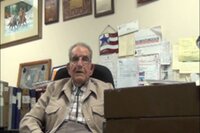| Title |
Smith, Bert OH9_022 |
| Creator |
Weber State University, Stewart Library: Oral History Program |
| Contributors |
Smith, Bert, Interviewee; Jouffray, Christine, Interviewer |
| Collection Name |
Weber and Davis County Community Oral Histories |
| Description |
The Weber and Davis County Communities Oral History Collection includes interviews of citizens from several different walks of life. These interviews were conducted by Stewart Library personnel, Weber State University faculty and students, and other members of the community. The histories cover various topics and chronicle the personal everyday life experiences and other recollections regarding the history of the Weber and Davis County areas. |
| Abstract |
The following includes the transcript and a video clip from an oral history interview with Bert Smith. |
| Image Captions |
Bert Smith |
| Subject |
Ogden Stockyard; Agriculture |
| Digital Publisher |
Stewart Library, Weber State University, Ogden, Utah, USA |
| Date |
2015 |
| Date Digital |
2015 |
| Temporal Coverage |
1920; 1921; 1922; 1923; 1924; 1925; 1926; 1927; 1928; 1929; 1930; 1931; 1932; 1933; 1934; 1935; 1936; 1937; 1938; 1939; 1940; 1941; 1942; 1943; 1944; 1945; 1946; 1947; 1948; 1949; 1950; 1951; 1952; 1953; 1954; 1955; 1956; 1957; 1958; 1959; 1960; 1961; 1962; 1963; 1964; 1965; 1966; 1967; 1968; 1969; 1970; 1971; 1972; 1973; 1974; 1975; 1976; 1977; 1978; 1979; 1980; 1981; 1982; 1983; 1984; 1985; 1986; 1987; 1988; 1989; 1990; 1991; 1992; 1993; 1994; 1995; 1996; 1997; 1998; 1999; 2000; 2001; 2002; 2003; 2004; 2005; 2006; 2007; 2008; 2009; 2010; 2011; 2012; 2013; 2014; 2015 |
| Item Size |
27p.; 29cm.; 2 bound transcripts; 4 file folders. 1 video disc: digital; 4 3/4 in. |
| Medium |
oral histories (literary genre) |
| Spatial Coverage |
Ogden, Weber County, Utah, United States, http://sws.geonames.org/11788968, 41.22809, -111.96766 |
| Type |
Text; Image/MovingImage |
| Conversion Specifications |
Filmed using a Sony HDR-CX430V digital video camera. Sound was recorded with a Sony ECM-AW3(T) bluetooth microphone. Transcribed using WAVpedal 5 Copyrighted by The Programmers' Consortium Inc. Digitally reformatted using Adobe Acrobat Xl Pro. |
| Language |
eng |
| Rights |
Materials may be used for non-profit and educational purposes, please credit University Archives, Stewart Library; Weber State University. |
| Source |
Smith, Bert OH9_022; Weber State University, Stewart Library, University Archives |
| Format |
application/pdf; video/mp4 |
| ARK |
ark:/87278/s6e758vv |
| Setname |
wsu_webda_oh |
| ID |
104145 |
| Reference URL |
https://digital.weber.edu/ark:/87278/s6e758vv |
| Title |
Smith, Bert OH9_022 |
| Creator |
Weber State University, Stewart Library: Oral History Program |
| Contributors |
Smith, Bert, Interviewee; Jouffray, Christine, Interviewer |
| Description |
The Weber and Davis County Communities Oral History Collection includes interviews of citizens from several different walks of life. These interviews were conducted by Stewart Library personnel, Weber State University faculty and students, and other members of the community. The histories cover various topics and chronicle the personal everyday life experiences and other recollections regarding the history of the Weber and Davis County areas. |
| Image Captions |
Bert Smith |
| Biographical/Historical Note |
The following is an oral history interview with Bert Smith. The interview was conducted on June 3, 2015, by Christine Jouffray, in Mr. Smith's office at his store. Bert is one of the founding partners of Smith and Edwards, an army surplus store founded in the 1950s in Ogden, Utah. He is 95 at the time of the interview. |
| Subject |
Ogden (Utah); Weber County |
| Digital Publisher |
Stewart Library, Weber State University, Ogden, Utah, USA |
| Date |
2015 |
| Date Digital |
2015 |
| Temporal Coverage |
1920-2015 |
| Item Size |
27p.; 29cm.; 2 bound transcripts; 4 file folders. 1 video disc: digital; 4 3/4 in. |
| Medium |
oral histories (literary genre) |
| Spatial Coverage |
Ogden, Weber County, Utah, United States, http://sws.geonames.org/11788968, 41.22809, -111.96766 |
| Type |
Text |
| Conversion Specifications |
Filmed using a Sony HDR-CX430V digital video camera. Sound was recorded with a Sony ECM-AW3(T) bluetooth microphone. Transcribed using WAVpedal 5 Copyrighted by The Programmers' Consortium Inc. Digitally reformatted using Adobe Acrobat Xl Pro. |
| Language |
eng |
| Rights |
Materials may be used for non-profit and educational purposes, please credit University Archives, Stewart Library; Weber State University. |
| Source |
Smith, Bert OH9_022; Weber State University, Stewart Library, University Archives |
| Format |
application/pdf |
| Setname |
wsu_webda_oh |
| ID |
104361 |
| Reference URL |
https://digital.weber.edu/ark:/87278/s6e758vv/104361 |





